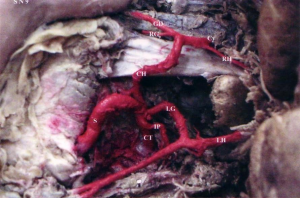International Journal of Anatomical Sciences 2010, 1: 31-33.
Research Paper
Variations in the Origin of Left Hepatic Artery
Pushpalatha K,a Shamasundar NM,a Najma M,a Shanmuganathan K.b
aDepartment of Anatomy, JSS Medical College, Mysore, Karnataka, India. bDepartment of
Anatomy, Aarubadevidu Medical College, Pondicherry, India.
Key Words: left hepatic artery, left gastric artery, celiac trunk, common hepatic artery, liver surgery
Abstract: Hepatic artery is the gateway to successful hepatobiliary surgeries. Left hepatic artery usually arises from the common hepatic artery. Aberrant left hepatic artery may arise from the left gastric / gastro duodenal / right hepatic / celiac trunk / splenic or from superior mesenteric artery (Williams et al., 1996). The origin of Left hepatic artery was studied in 50 cases by dissection method. After dissecting the branching pattern of common hepatic artery was noted and arteries were painted using red fevicryl paint and photograph was taken. Each photograph was given the specimen number. Left hepatic artery was seen arising from left gastric in 6 cases, from hepatic artery proper in 38 cases and from common hepatic in 6 cases. Left hepatic from left gastric lies in hepatogastric ligament and one must know this variation before dividing the ligament to reach the gastro esophageal junction.
Hepatic artery is the gateway to successful hepatobiliary surgery. Introduction of laparoscopic cholecystectomy has stimulated a renewed interest in the anatomy of the hepatic artery. Hepatic artery anatomy has been described adequately. Common hepatic artery arises from coeliac trunk and divides into gastro duodenal and hepatic artery proper. Hepatic artery proper divides into left and right hepatic artery (Williams et al., 1996). Aberrant left hepatic artery may arise from the left gastric / coeliac trunk directly / right hepatic / splenic artery / superior mesenteric/ gastro duodenal or from aorta (Hollinshed and Rosse, 1985). A new emphasis is given to this by the introduction of liver transplantation hence the present study.
Materials and Methods
50 specimens included embalmed 35 cadavers given for dissection to undergraduate students in department of Anatomy and 15 fresh specimens from postmortem bodies from department of forensic medicine, JSSMC, Mysore. Common Dissection method was used to study the specimens. After dissecting the branching pattern of Common hepatic artery was noted and arteries were painted using red fevicryl paint and photograph was taken. Each photograph was given the specimen number. Following statistical methods were employed in the present study
o Contingency Table analysis
o Chi-square test
Observations
Left hepatic artery arising from Hepatic artery proper was seen in 38 cases, from Left gastric in 6 cases and from Common hepatic in 6 cases (Table-1). The left hepatic arising from left gastric artery was found within the layers of hepatogastric ligament.
Chi-square value of 40.96 was found to be highly significant (P<. 000), indicating that maximum number of cases was observed in HP (76%), followed by LG (12%) and CH (12%). These figures are diagrammatically represented in Fig. 1.
Table 1 Frequency in variation of Left hepatic
| Frequency | Percent |
Cumulat iv e Percent |
||
| LH | HP |
38 |
76.0 | 76.0 |
| LG |
6 |
12.0 | 88.0 | |
| CH |
6 |
12.0 | 100.0 | |
| Total |
50 |
100.0 | ||
Fig. 1 Bar diagram showing the frequency in variation of Left hepatic arter
LH-Left hepatic, CH-Common hepatic, HP- Hepatic proper, LG-Left gastric. Chi-square =40.96; P< .000 (Highly significant)
Fig. 2 Left hepatic artery arising from Left gastric artery
LH-Left hepatic, CH-Common hepatic, HP-Hepatic proper, LG-Left gastric, CT-Celiac trunk, GD-Gastro duodenal, IP-Inferior phrenic artery, Cy-Cystic artery, RG-Right gastric, S – Splenic artery, S.N 9-Specimen number 9.
Discussion
Left hepatic artery usually arises from the common hepatic artery. Aberrant left hepatic artery may arise from the left gastric, celiac trunk directly, right hepatic, splenic artery, superior mesenteric, sastro duodenal or from aorta.
| Source | Michel | RM Jones &KJ Hardy | Presentstudy |
| CH | 85% | 81% | 12% |
| HP | – | – | 76% |
| LG | 11% | 15% | 12% |
| Others | 4% | 4% | 0% |
Table 2 Origin of left hepatic compared with other study
In the present study Left hepatic artery was seen arising from Hepatic artery proper in 76% of cases but Michels (1955) observed that in 85% of cases left hepatic was arising from Common hepatic and Jones and Hardy (2001) observed that in 81% of cases left hepatic was arising from Common hepatic. Present study value of left hepatic artery from left gastric artery was almost near to their study (Table 2). They have not mentioned about Left hepatic artery from hepatic artery proper. This difference may be because we have considered the hepatic artery into common hepatic and hepatic artery proper.
Conclusion
Left hepatic arising from left gastric was observed in 12% of cases. This branch lies in the hepato gastric ligament and one must consider the possibility of such an artery before dividing the ligament to reach the gastro esophageal junction (Jones,2001). Surgeons should be aware of this during ligating left gastric artery because sometimes it forms the sole blood supply to the left lobe of liver.
References
Hollinshead H, Rosse C (1985) Text book of Anatomy. 4th Edition. Philadelphia: Harper and Row. 324-640.
Jones RM, Hardy KJ (2001) The hepatic artery – a reminder of surgical anatomy. J R Coll Surg Edinb, 46: 168-170.Michels NA (1955) Blood supply and Anatomy of the upper abdominal organs. USA: JB Lippincott Company. 32-73.Williams PL, Bannster LH, Berry M. et al (1996) Gray’s anatomy. 38th Edition. London: Churchill Livingstone. 1548-1553.

